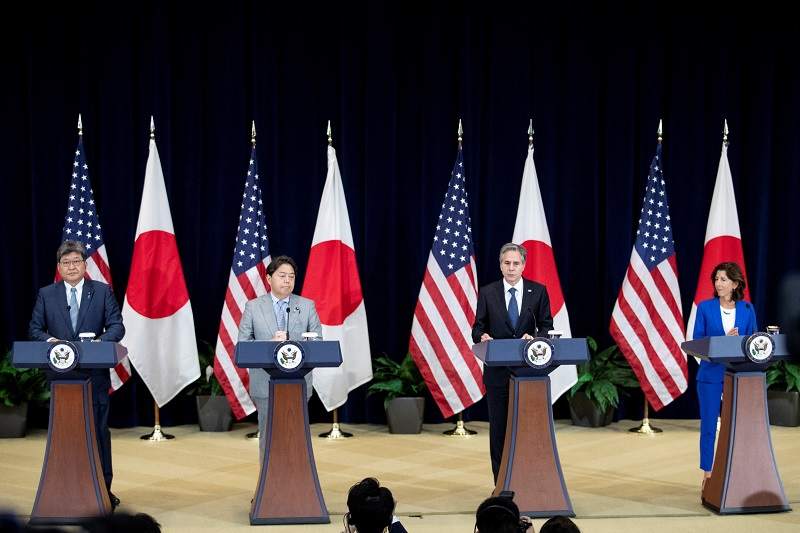Japan-U.S. to boost economic cooperation, eying China

U.S. Secretary of State Antony Blinken, second from right, and Commerce Secretary Gina Raimondo, right, hold a joint news conference with Foreign Minister Yoshimasa Hayashi and Economy, Trade, and Industry Minister Koichi Hagiuda in Washington on Friday.
1:00 JST, August 1, 2022
WASHINGTON — The Japanese and U.S. governments have clarified their intent to strengthen economic security through close cooperation to counter China’s rising military and economic power, and prepare for a possible emergency in Taiwan.
Economy, Trade and Industry Minister Koichi Hagiuda stressed the importance of next-generation semiconductors in particular at a press conference following the meeting of the Japan-U.S. Economic Policy Consultative Committee in Washington on Friday.
“The most important area for Japan-U.S. cooperation is the development of next-generation semiconductor technology, which will determine who has the competitive edge in the industry in the future,” Hagiuda said.
The two countries intend to promote bilateral cooperation in the field of semiconductors, including research and development, human resource development and supply chain enhancement, according to Hagiuda.
Japan holds a 15% share of the global semiconductor manufacturing market, and the U.S. holds 12%. But when it comes to advanced products with circuit line widths of less than 10 nanometers — 1 nanometer is one billionth of a meter — Taiwan’s share is 90%. In semiconductors, the finer the line width, the higher the performance and power savings.

With advances in digitization pushing up demand for cutting-edge semiconductor products, the Japanese and U.S. governments are keenly aware of the danger that procurement of such products could be disrupted in the event of an emergency situation in Taiwan.
The U.S. has strengths in chip design and development, while Japan has strengths in semiconductor manufacturing equipment and components. The two countries aim to complement each other to develop cutting-edge products and break away from their dependence on Taiwan.
The U.S. Congress passed a bill to invest $52.7 billion (about ¥7 trillion) in subsidies to support semiconductor production and R&D.
U.S. Commerce Secretary Gina Raimondo said that Japan is a world leader in chemicals, substrates of computer chips and materials.
Japan and the United States will also promote support for battery development, critical mineral procurement and the strengthening of critical infrastructure such as telecommunication networks.
China is highly competitive in the raw materials for batteries, which are indispensable for the realization of a decarbonized society. Among materials for electric vehicle batteries, more than 50% of lithium and cobalt and 30% of nickel are processed in China, according to a private research firm.
“If China stops exporting, the global battery industry will cease to exist,” said a battery industry insider.
Japan and the United States will cooperate in providing financial support to build a supply network for critical minerals such as lithium, and will also support Japanese battery manufacturers that aim to enter the U.S. market.
The U.S. side probably hopes to attract Japanese manufacturers with transparency in the procurement of raw materials.
The two countries will also accelerate cooperation on the high-speed, high-capacity 5G telecommunication technology and next-generation standards amid concerns that they could fall behind in the digital sector due to the dominance of Chinese companies such as Huawei Technologies Co.
The U.S. side also asked Japan for cooperation in export controls to prevent the misuse of technology.
Semiconductors and artificial intelligence are directly linked to the enhancement of military power, which has increased the momentum for the protection of technologies in Japan and the United States, triggered in part by the enactment of the economic security promotion law in Japan in May.
“An environment is now in place to share more export control information between Japan and the United States,” sources in the Japanese delegation said.



